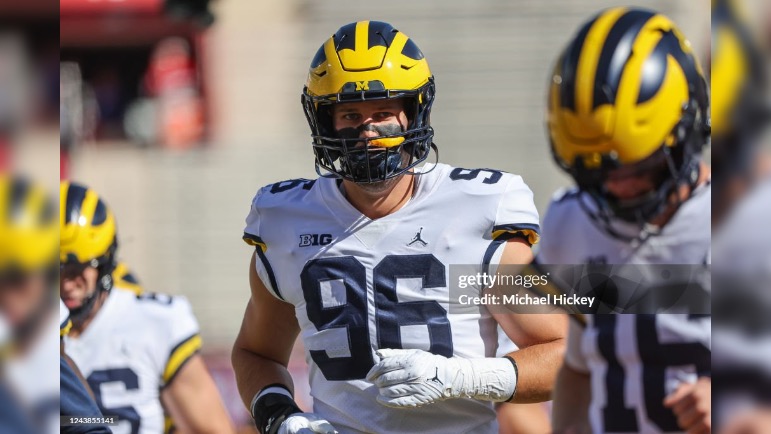Most fans know the NFL has an offseason maximum of a 90-man roster. Yet the Pittsburgh Steelers, after signing WR Jacob Copeland and claiming DL Willington Previlon, have a 91-man group. So how is the team one-over the maximum? That’s because of the International Exemption for rookie undrafted free agent outside linebacker Julius Welschof.
We’ve mentioned Welschof’s situation several times throughout our posts and podcasts. But to detail it fully, here’s what the exemption means and applies to the team throughout the offseason and regular season.
International Exemption Definition
Julius Welschof falls under the NFL’s International Player Pathway (IPP) exemption. Per the NFL website, here is who is eligible:
“A qualifying international player is a person whose citizenship and principal place of residence are outside the United States and Canada, and who have a maximum of two years of United States high school experience. In addition, an international player must (i) satisfy all NFL player eligibility rules and (ii) have been eligible for a prior NFL Draft.”
While the NFL has handled these players differently in past years, once rotating them by division, a 2024 rule change allows every team to house at least one such player on its roster.
Welschof, now 27 years old, wasn’t technically part of the NFL’s official IPP program that saw players like United Kingdom OT Travis Clayton get drafted by the Buffalo Bills or rugby star Louis Rees-Zammit get signed by the Kansas City Chiefs. But the league allows for any player who satisfies the above rules to quality, even if they weren’t part of the league’s program and training.
Julius Welschof’s Background
Before diving into the nitty gritty of how the exemption works, a brief backstory on Welschof. He was born in the town of Miesbach in Bavaria, Germany, which has a population of roughly 12,000. Unlike many who came to the States early in life, Welschof earned his high school degree in Germany.
He moved to the United States shortly after high school. Football became a thought after he visited his grandfather in Jacksonville, Florida, who proposed the idea of him playing college football in America. Still just 16 at the time, he went back to Germany and played for a club team, the Munich Cowboys, seeing time as a defensive end and tight end while trying to understand the game one snap at a time.
He linked up with Brandon Collier, a former CFL player who moved to Europe and started a training program to help further his football skills and land on college radars. Per the Charlotte Observer and Yahoo News, Welschof used money as a mechanical engineer apprentice while also renovating homes to pay for training and trips. His work paid off, earning a scholarship offer from the University of Michigan. They were one of several schools to offer.
He spent five seasons with the Wolverines, mostly playing on special teams (here’s a cut-up of him running down kicks) before entering the transfer portal ahead of the 2023 season. USC offered a scholarship, but he turned them down to join Charlotte, following some of his Michigan coaches who took jobs with the 49ers. Welschof was poised for serious playing time but suffered a season-ending shoulder injury four games into the season. His college career ended with 29 tackles and one sack.
Healthy enough for his Pro Day, he weighed in at an intriguing 6065, 257 pounds. His testing was mostly solid, a 4.82 40-yard dash and a 10’2″ broad jump, but his 7.01 three-cone time jumps off the page. For most, anything under seven is considered excellent. Knowing how big Welschof is, to be a smidge over that mark is impressive.
He signed with Pittsburgh as an UDFA after the 2024 NFL Draft, receiving a $5,000 signing bonus. For being an “international player,” he’s been stateside for six years, and football is far from brand new.
Exemptions (Offseason)
As we noted, Julius Welschof is an exemption from the 90-man roster rule for the offseason and training camp. Pittsburgh can have an effective 91-man roster so long as he’s with the team. And right now, they’re at that cap. They can remain at 91 all the way through final cutdowns, 4 PM/EST on August 27, when the roster must be trimmed to 53.
It’s also worth noting that teams can only designate one international player on their roster, even if they have more than one who qualifies. While the Chiefs’ Louis Rees-Zammit came from the IPP and was eligible for the exemption, the team also rostered OT Jason “Chu” Godrick, another eligible player. They used the exemption on Godrick, meaning Rees-Zammitt is treated like a “normal” rostered player.
So Julius Welschof will be the Steelers’ lone exemption of 2024.
Exemptions (In-Season)
This is where things get interesting. Off the top, Welschof can not be an exemption to the 53-man roster. He can’t be the 54th. However, he can be an exemption as the Steelers’ 17th practice squad player, one above the typical maximum of 16.
Previously, rules stated that if Welschof was utilized as a practice squad exemption, he was stuck there all year. He couldn’t be promoted or called up to appear in a game. But, as I found out researching this, the league recently changed their rules to allow that player to be a practice squad elevation.
“Beginning in 2024, each of the 32 NFL clubs is eligible to fill a 17th roster spot on its practice squad, reserved for an international player. A participating club is permitted to elevate its international practice squad player to its active roster a maximum of three times throughout the season — increasing the flexibility for clubs to leverage the additional player, while creating more opportunity to play.”
However, it comes with caveats. As outlined in this 2021 memo, here is how the process works.
1. An international player must first terminate his exemption and be allocated to a “normal” spot on the practice squad. Meaning that the team no longer gets to carry an extra player. They must carry 16, the international player being one of them.
2. The player must first spend three games on the practice squad (a bye week counts as a game).
3. The player can then either sign a contract to the 53-man roster or be elevated like a practice squad player and sent down after the week ends.
4. Once the player terminates his exemption, he can’t get it back at any point during the year.
Meaning an international player is eligible to play in a game, but he would functionally serve as a “regular” player at that point in his career. The team won’t have the benefit of the extra player anymore. Still, it creates more flexibility than the static rules of the past.
2024 Outlook
Julius Welschof will most likely go through the summer with the Steelers and sign to the practice squad as their 17th member and International Exemption. He wouldn’t be the first to do so. United Kingdom and rugby player TE Christian Scotland-Williamson spent time in the Steelers’ camp and the practice squad from May 2018 through July 2020. After being cut, he returned home and continued playing rugby.
Barring something unforeseen, it’s doubtful Welschof will get the chance to shed his exemption and see regular-season action. And at 27, there’s not much time for development. But he’s more refined to the game than others, having played it for a decade, including six years in college.
If the NFL doesn’t work out, his rights have also been drafted by the CFL Calgary Stampeders.
I think he’ll make an impression on the coverage units, while our Josh Carney praised his run defense. His pass-rush moves leave a lot to be desired, and that’s where his game will have to grow the most. But the coaching staff is impressed, and his work ethic is excellent, making him someone worth watching this summer. At his size, he’ll be hard to miss.








